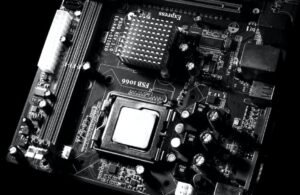Where AI Is Used
Artificial Intelligence (AI) has become an integral part of our daily lives, impacting various industries and sectors. From self-driving cars to virtual assistants, AI technology has revolutionized the way we live and work. In this article, we will explore the key areas where AI is being used and its potential future implications.
Key Takeaways:
- AI is used in diverse fields such as healthcare, finance, retail, and manufacturing.
- AI-powered chatbots and virtual assistants enhance customer experiences.
- Machine learning algorithms improve decision-making processes.
- AI helps in automating repetitive tasks, increasing efficiency and productivity.
We are witnessing a significant increase in the use of AI across industries. In healthcare, AI is playing a crucial role in diagnosing diseases, analyzing medical images, and personalizing treatment plans. It assists healthcare professionals in making accurate and timely decisions, improving patient outcomes. For example, AI algorithms have shown promising results in early detection of cancer cells.
Enhancing Customer Experiences
The use of AI-powered chatbots and virtual assistants has transformed customer interactions in the retail, banking, and hospitality sectors. These intelligent systems can quickly respond to queries, provide personalized recommendations, and even mimic human-like conversation. Companies are leveraging AI to improve customer satisfaction and increase sales. AI-driven chatbots have proven to reduce customer response time and improve customer engagement.
Improving Decision-Making
The implementation of AI algorithms and machine learning techniques enables organizations to make data-driven decisions with greater accuracy. By analyzing vast amounts of data, AI systems can identify patterns, trends, and correlations that humans may overlook. This is particularly useful in finance and insurance sectors where AI-powered algorithms can predict market trends, assess credit risk, and detect fraudulent activities. The use of AI in finance has led to more automated trading and enhanced risk management strategies.
Let’s take a closer look at some fascinating data about AI usage in different industries:
| Industry | AI Applications |
|---|---|
| Healthcare | Medical image analysis, disease diagnosis, personalized treatment plans |
| Retail | Chatbots, personalized recommendations, inventory management |
| Finance | Automated trading, credit risk assessment, fraud detection |
In addition to finance and healthcare, AI is also revolutionizing the manufacturing industry. Intelligent robots and computer vision systems are being used for automated assembly, quality control, and predictive maintenance. These AI-powered solutions improve operational efficiencies, reduce costs, and minimize errors. AI has enabled factories to achieve greater levels of precision and productivity.
Automating Repetitive Tasks
One of the key advantages of AI is its ability to automate repetitive tasks, freeing up human resources for more complex and creative work. In various industries, from logistics to customer service, AI-powered systems are taking over mundane and time-consuming tasks. This leads to increased efficiency, reduced costs, and better resource allocation. AI’s capability to handle large volumes of data and perform routine tasks with precision has propelled automation across sectors.
Here are a few more interesting data points on AI adoption:
| Industry | AI Adoption Rate |
|---|---|
| Manufacturing | 75% |
| Retail | 57% |
| Finance | 46% |
The future of AI looks promising, with advancements in areas such as natural language processing, computer vision, and robotics. As AI technology continues to evolve, it will undoubtedly disrupt more industries, bringing about further innovation and efficiency. The potential applications of AI are vast, and we can expect it to play an even more prominent role in our daily lives in the coming years.
Get Ready for the AI Revolution
In conclusion, AI has revolutionized various industries, from healthcare to finance, by automating tasks, improving decision-making processes, and enhancing customer experiences. The widespread adoption of AI is transforming the way businesses operate and interact with their customers. By harnessing the power of AI, organizations can gain a competitive edge, increase productivity, and unlock new opportunities for growth.

Common Misconceptions
There are several common misconceptions about where artificial intelligence (AI) is used. These misconceptions often arise from a lack of understanding or misinformation. Let’s explore some of these misconceptions and clarify the reality of AI applications.
Misconception 1: AI is only used in advanced robotics
- AI is deployed in various industries, not just robotics.
- AI is used in healthcare for diagnosis and treatment planning.
- AI is utilized in finance for fraud detection and trading algorithms.
Contrary to popular belief, AI is not confined to advanced robotics. While AI does play a significant role in robotics, its applications extend far beyond this field. AI technologies are leveraged in various industries to solve complex problems, improve efficiency, and enhance decision-making processes.
Misconception 2: AI will replace human jobs entirely
- AI is designed to augment human capabilities, not replace them.
- AI automates repetitive tasks, freeing up time for more complex and creative tasks
- AI creates new job opportunities in developing and managing AI systems.
While AI may automate certain tasks, it is not intended to replace human jobs entirely. Instead, AI is developed to complement human skills and improve productivity. By automating repetitive and mundane tasks, AI allows humans to focus on more critical, creative, and engaging work. Moreover, the development and implementation of AI systems generate new employment opportunities in the field of AI research, development, and maintenance.
Misconception 3: AI is only used by tech giants and large corporations
- AI is accessible to businesses of all sizes through cloud-based services.
- AI tools and frameworks are open-source, enabling widespread adoption.
- AI is increasingly integrated into consumer products and services.
Despite the belief that AI is exclusively used by tech giants and large corporations, AI is accessible to businesses of all sizes. Cloud-based AI platforms provide affordable access to AI capabilities, allowing small and medium-sized businesses to leverage AI for their operations. Furthermore, open-source AI tools and frameworks facilitate widespread adoption and innovation in the AI community. Additionally, AI is becoming more prevalent in consumer products and services, enabling individuals to benefit from AI functionalities in their day-to-day lives.
Misconception 4: AI is infallible and error-free
- AI systems can make mistakes and require continuous refinement.
- AI can be biased if not properly trained and monitored.
- AI’s decisions should be validated and verified by human experts.
AI systems are not immune to errors or biases. They require continuous refinement, training, and monitoring to ensure optimal performance. Without proper training and monitoring, AI systems can inadvertently develop biases that reflect societal prejudices. Hence, it is crucial to subject AI decisions to human validation and oversight, particularly in sensitive areas like healthcare and law. Human experts play a vital role in verifying the accuracy, fairness, and ethical considerations of AI outputs.
Misconception 5: AI possesses general intelligence like humans
- AI lacks human-like understanding and common sense.
- AI is designed for specific narrow tasks and lacks human adaptability.
- AI does not possess consciousness or self-awareness.
Despite the advancements in AI, current AI systems lack the general intelligence and adaptability exhibited by humans. AI is designed for specific tasks and operates within predefined boundaries. AI lacks human-like understanding, common sense, and the ability to interpret information in context. Furthermore, AI systems do not possess consciousness or self-awareness, as they operate based on programmed algorithms and data-driven models.

AI in Healthcare
A study conducted by Frost & Sullivan revealed that AI in healthcare has the potential to improve patient outcomes by 30% while reducing treatment costs by 50%. The following table highlights some key areas where AI is being used in healthcare.
| Application | Benefits |
|---|---|
| Diagnostic Imaging | Accurate detection of abnormalities and early diagnosis |
| Drug Discovery | Accelerated development and optimization of new drugs |
| Personalized Medicine | Tailored treatments based on genetic and medical data |
| Virtual Assistants | Improved patient engagement and real-time support |
AI in Education
Artificial intelligence is transforming the education sector, revolutionizing teaching methodologies and student learning experiences. The table below presents various applications of AI in education.
| Application | Benefits |
|---|---|
| Smart Tutors | Individualized learning and personalized feedback |
| Intelligent Content | Adaptive learning materials tailored to student abilities |
| Virtual Reality (VR) | Immersive educational experiences and simulations |
| Automated Grading | Efficient grading and feedback generation |
AI in Finance
The financial industry heavily relies on AI to streamline operations, detect fraud, and make better investment decisions. The following table provides insights into AI’s impact in the finance sector.
| Application | Benefits |
|---|---|
| Automated Trading | Faster trade execution and reduced human errors |
| Fraud Detection | Early detection of fraudulent activities and prevention |
| Algorithmic Risk Assessment | Better risk management and mitigation strategies |
| Customer Service Chatbots | 24/7 customer support and quick query resolution |
AI in Transportation
The transportation sector is undergoing a rapid transformation with the integration of AI technologies. The table below showcases the impact of AI in transportation.
| Application | Benefits |
|---|---|
| Autonomous Vehicles | Enhanced road safety and reduced traffic congestion |
| Route Optimization | Efficient route planning and fuel consumption reduction |
| Intelligent Traffic Systems | Improved traffic management and real-time updates |
| Smart Parking | Optimized parking space utilization and reduced search time |
AI in Retail
The retail industry leverages AI to enhance customer experiences, optimize inventory management, and boost sales. The table below provides insights into AI’s applications in the retail sector.
| Application | Benefits |
|---|---|
| Chatbot Assistants | 24/7 customer support and personalized recommendations |
| Visual Search | Effortless product discovery and simplified shopping |
| Price Optimization | Dynamic pricing strategies to maximize profit margins |
| Recommendation Systems | Personalized product suggestions driving sales |
AI in Manufacturing
The manufacturing industry benefits from AI by optimizing production processes, increasing efficiency, and ensuring product quality. The table below showcases AI’s impact on manufacturing.
| Application | Benefits |
|---|---|
| Robotic Process Automation | Automated repetitive tasks and increased productivity |
| Predictive Maintenance | Reduced downtime and improved machine reliability |
| Quality Control | Real-time monitoring and detection of product defects |
| Supply Chain Optimization | Efficient inventory management and demand forecasting |
AI in Entertainment
The entertainment industry exploits AI to create immersive experiences, develop engaging content, and enhance audience interactions. The following table highlights AI’s applications in the entertainment sector.
| Application | Benefits |
|---|---|
| Recommendation Systems | Personalized content suggestions and improved user engagement |
| Virtual Reality (VR) | Immersive gaming and virtual experiences |
| Emotion Recognition | Enhanced audience analysis and tailored content delivery |
| AI-generated Content | Automated content creation and customization |
AI in Agriculture
The agriculture sector harnesses AI to optimize crop yield, monitor livestock, and ensure sustainable farming practices. The following table presents AI’s applications in agriculture.
| Application | Benefits |
|---|---|
| Precision Farming | Optimized resource utilization and increased crop production |
| Livestock Monitoring | Real-time health monitoring and early disease detection |
| Weed and Pest Control | Targeted and eco-friendly pest management strategies |
| Weather Forecasting | Accurate predictions for efficient farming operations |
AI in Cybersecurity
As cyber threats continue to evolve, AI plays a critical role in detecting and preventing malicious activities, safeguarding valuable data and networks. The table below illustrates various applications of AI in cybersecurity.
| Application | Benefits |
|---|---|
| Behavioral Analytics | Identification of anomalous behavior and attribute-based access control |
| Threat Intelligence | Automated collection and analysis of threat data for proactive defense |
| Vulnerability Management | Identification and prioritization of system vulnerabilities |
| Malware Detection | Real-time analysis and blocking of malicious software |
The integration of artificial intelligence across various industries is revolutionizing the way we work, learn, and live. From healthcare to entertainment, AI is increasing efficiency, personalization, and decision-making capabilities. These tables highlight just a few of the many applications of AI. As technology continues to advance, it is crucial to embrace the opportunities and address potential challenges to fully unlock AI’s potential for a better future.
Frequently Asked Questions
Where AI Is Used
- Q: What is artificial intelligence (AI)?
- A: Artificial intelligence, or AI, refers to the development of computer systems that can perform tasks that typically require human intelligence. These systems are designed to perceive their environment, learn from past experience, and make decisions or take actions accordingly.
- Q: Where is AI used?
- A: AI is used in various domains and industries. Some common applications of AI include virtual assistants like Siri and Alexa, recommendation systems for personalized content, self-driving cars, fraud detection, healthcare diagnostics, robotics, and many more.
- Q: How does AI impact healthcare?
- A: AI has the potential to revolutionize healthcare by enhancing diagnostics, predicting disease outbreaks, optimizing treatment plans, and improving patient care. It can analyze large amounts of medical data, assist in medical imaging interpretation, and even provide virtual nursing support.
- Q: Can AI replace human jobs?
- A: While AI has the ability to automate certain tasks previously performed by humans, it is unlikely to completely replace human jobs. Instead, AI is more likely to augment human capabilities, allowing individuals to focus on more complex problem-solving and creative tasks.
- Q: Is AI a threat to humanity?
- A: AI poses both opportunities and challenges. While there are concerns about the potential misuse or unintended consequences of AI, many experts believe that with proper governance and responsible development, AI can significantly benefit humanity and improve our quality of life.
- Q: How is AI used in finance?
- A: In the financial sector, AI is utilized for fraud detection, algorithmic trading, portfolio management, customer service chatbots, credit scoring, and risk assessment. It can analyze large volumes of financial data quickly and help automate tasks such as underwriting and compliance.
- Q: What are the ethical implications of AI?
- A: AI raises ethical concerns regarding privacy, bias, accountability, transparency, and job displacement. It is crucial to address these issues to ensure that AI systems are developed and deployed responsibly, considering the potential impact on individuals, society, and the environment.
- Q: Is AI used in the entertainment industry?
- A: Yes, AI is used in the entertainment industry for various purposes. It is employed in recommendation systems to personalize content suggestions, virtual reality and augmented reality applications, content creation and editing, voice recognition for dubbing, and even in the development of lifelike virtual characters.
- Q: How is AI being used in transportation?
- A: AI is being used in transportation for the development of self-driving cars, traffic prediction and optimization, route planning, and logistics management. It can help improve vehicle safety, reduce congestion, and enable more efficient and sustainable transportation systems.
- Q: What are some challenges in AI implementation?
- A: Some challenges in AI implementation include data quality and availability, ethical considerations, technical limitations, lack of skilled professionals, and integration with existing systems. It is important to address these challenges to unlock the full potential of AI in various domains.




